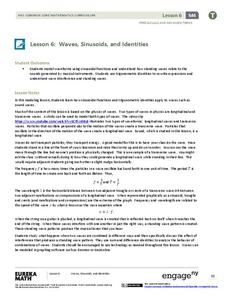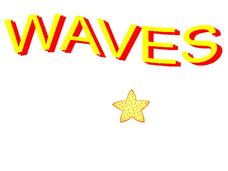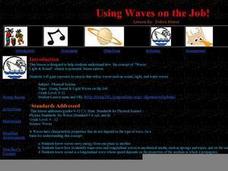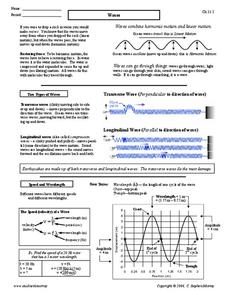Curated OER
Typical Conceptual Questions for Physics I - Waves, Electricity, and Magnetism
This wave and electromagnetism assignment is so thorough, it could be used as a unit exam. The first section of it covers wave concepts. The next section addresses static electricity. There is a section that deals with electric circuits....
California Department of Education
What Is a "Wave"?
Take a stretch, but don't wave goodbye. An interesting resource provides everything needed to present an introductory lesson plan on waves. Teachers present a PowerPoint defining the types of waves and their characteristics. Pupils use a...
College Board
2018 AP® Physics 1: Algebra-Based Free-Response Questions
Whether determining orbitals of space craft or designing experiments with conductive dough, many young scientists discover physics is phun and attempt the AP exam to get college credit. Use the free response questions from the 2018...
Physics Classroom
Wavelength
Physics class sure can have its ups and downs! The first in a series of seven interactives from the Waves and Sound series introduces young learners to the concept of wavelength. Scholars work through the interactive to discover the...
National Nanotechnology Infrastructure Network
Jell-O® Waveguide and Power Loss
Jell-O® can help model the transmission of light through fiber optic cables. Young scientists use the jiggly dessert to make a waveguide to transmit a laser beam from one point to another. Their models help them learn the function of...
DiscoverE
Slinky® Science
Toys are great for learning about physics. Scholars use Slinky® toys to study Newton's laws of motion and types of energy. After a little play, they then model longitudinal and transverse waves with the Slinky® toys.
Cornell University
Sound Waves
How does sound travel through different mediums? Scholars explore this question by creating and observing sound waves as they learn the difference between transverse and longitudinal wave motion. Using their new knowledge, class members...
Columbus City Schools
Making Waves
Learning about waves can have its ups and downs, but a demo-packed tool kit has the class "standing" for more! Learners gain experience with several different wave types, organizing observations and data, and wave terminology. The...
CK-12 Foundation
Stadium Wave
If you are at a sports match and the crowd starts two waves that are both headed toward you at the same time, what do you do? The simulation applies the concepts of constructive interference and destructive interference to that very...
McGraw Hill
Doppler Shift Interactive
Ever wonder why a siren sounds different when it's coming toward you than when it's going away from you? It all depends on the motion of the sound waves! The interactive activity demonstrates how the Doppler effect impacts the motion of...
Bowels Physics
Waves and Sound
Explore how sound travels as waves with a straightforward lesson that explains the basics of waves in relation to sound. The presentation considers sound waves in both open and closed pipes and shows how to calculate wavelength and...
EngageNY
Waves, Sinusoids, and Identities
What is the net effect when two waves interfere with each other? The lesson plan answers this question by helping the class visualize waves through graphing. Pupils graph individual waves and determine the effect of the interference...
Urbana School District
Waves
What is a physicist's favorite part of sports? Doing the wave. The presentation covers longitudinal, transverse, surface, and standing waves. It includes in-depth information on frequency, wavelength, period, amplitude, reflection,...
It's About Time
Slinkies and Waves
Slinkies® are a great tool for visualizing waves. Pupils work in groups to create both transverse and longitudinal waves before using a polarizer to analyze the ways they are able to travel.
Curated OER
Waves
An incredibly colorful PowerPoint presents all the facts and definitions about waves that you could need for beginning physical scientists. There are several useful links to online animations of wave action. This may have been produced...
Curated OER
Using Waves on the Job!
A colorful and comprehensive PowerPoint highlights this lesson on waves. Junior geophysicists pretend that they are hired to analyze seismic waves. A worksheet is provided to go along with an online article about how compact discs work...
PBS
Measuring Waves | UNC-TV Science
Discover the secrets used by scientists to measure mechanical waves. Young physicists learn about measurable wave qualities—amplitude, wavelength, and frequency—by watching and listening to a video discussing longitudinal and transverse...
Mr. E. Science
Characteristics of Waves
Waves, waves, and more waves. Here, class members look at the many types and characteristics of energy waves including transverse, longitudinal, standing, seismic, p-waves, s-waves, and l-waves.
Acoustical Society of America
Anatomy of a Wave
Pair physical science learners up, and have one describe a transverse wave while the other blindly attempts to draw it. Then reveal an actual diagram and explain the different parts of the wave: crest, trough, wavelength. Though most of...
Curated OER
Slinky Movement Lab
For this wave worksheet, students use Slinky's to observe the properties of waves. They observe longitudinal waves, transverse waves, traveling waves and standing waves and record their observations. They calculate the frequency and...
Curated OER
Characteristics of Waves
In this characteristics of waves worksheet, students answer 9 questions about the structure of waves, the types of waves and the components of waves. They describe the frequency of a wave and calculate the velocity and frequency of waves.
Curated OER
Waves
In this waves worksheet, high schoolers read about harmonic and linear motion in waves as well as the two types of waves. They match 5 terms to their definitions about the structure of waves, they solve for the wavelength, frequency and...
Curated OER
HW Unit 10:5-Sound
In this sound worksheet, students answer 17 questions about sound, the wavelength of sounds, the frequency of sounds, the speed of sound, the types of sound waves and the effects of the medium sound travels through on its speed.
Curated OER
Waves
For this waves worksheet, learners read about the different types of waves and how the speed of waves is calculated. Then students complete 5 matching, 8 fill in the blank, and 9 short answer questions.

























